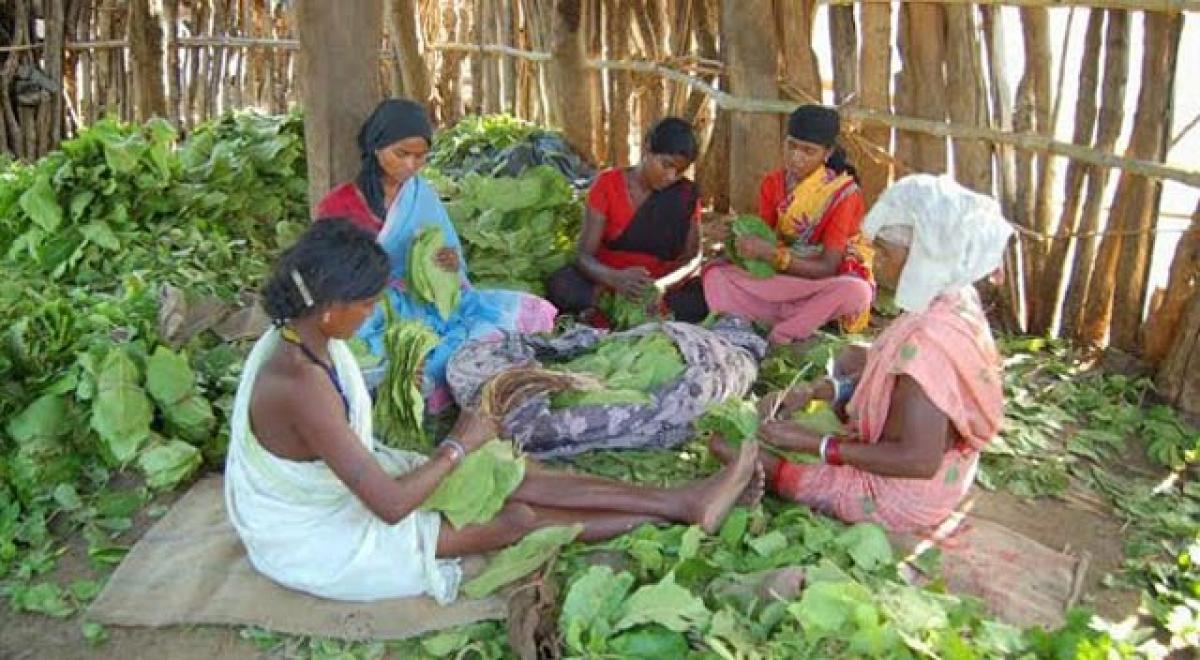Live
- National Energy Conservation Day 2024: Date, Importance, and Easy Ways to Save Energy
- Gastronomic trouble: After 'disappearing' samosas Himachal CM in row over red jungle fowl
- Meaningful dialogue a priceless jewel of democracy: Jagdeep Dhankhar
- CM Revanth Reddy Advocates for Gurukuls as Talent Development Centers
- Zepto’s expenses surge over 71 pc in FY24, losses at Rs 1,248 crore
- Tim Southee matches Chris Gayle's six-hitting record in his farewell Test
- AP Mnister Ponguru Narayana Inspects Highway Connectivity Roads to Amaravati
- Reduced inflow: Water levels in Chembarambakkam, Poondi reservoirs drop
- Slapgate haunts CM as Rohini slams Nitish following Patna DM’s action against BPSC candidate
- Amazon Music India Unveils 'Best Of 2024’ Celebrating Top Hits, Artists & Podcasts
Just In

The Telangana State Government has issued an order for regularisation of land transfers effected on ‘Sada Bainamas’ (plain papers) trampling the land rights of adivasis. Non-Tribals are making a beeline to the revenue offices to secure title deeds for their land occupations in the Scheduled Areas of the State.
The Telangana State Government has issued an order for regularisation of land transfers effected on ‘Sada Bainamas’ (plain papers) trampling the land rights of adivasis. Non-Tribals are making a beeline to the revenue offices to secure title deeds for their land occupations in the Scheduled Areas of the State. The GO is diluting the letter and spirit of the land rights protections extended to adivasis under Land Transfer Regulations.
The Government issued GO Ms 153 for regularisation of land transfer deals on ‘Sada Bainamas’ held prior to June 2, 2014, exempting from payment of registration fees up to Ac 5.00 of land. For effective implementation of the order District Collectors are empowered under Record of Rights Act (RoR) 1989 to regularise the alienations effected on the basis of Sada Bainama for agricultural lands as a one-time settlement.
As per the report of Centre for Good Governance 2014 there are an estimated 12-15 lakh tenant farmers coming under the Sada Bainama category in the undivided Andhra Pradesh. Whereas, a conservative estimate shows that nearly one lakh acre in each of the Telangana districts is under Sada Bainamas.
Although the protective Land Transfer Regulations (LTR) had been in force, it was observed by several committees that non-tribals were able to find ways and means to circumvent the provisions of LTR 1 of 1959 as amended by 1 of 70 (LTR) by entering into benami transactions and other clandestine transactions with unsophisticated tribals.
The AP High Court while dealing with the case between Vemula Bhaskararao Vs State of Andhra Pradesh, in 2008 held that unregistered sale papers cannot be taken into account, while examining the nature of tribal rights under LTR. The LTR Amendment of 1978 completely banned the registration of land transfers in favor of non-tribals in the Scheduled Areas.
Thus, the question of giving exemption to farmers including non tribals from payment of Stamp Duty and Registration Fees under the Indian Stamp Duty Act and Registration Act does not arise. The GO was issued on revenue grounds and to woo the farmers in Telangana in general but it will certainly pave the way non-tribals to secure pattadar pass books and title deeds under RoR Act, in which there is a provision directing the authorities not to grant title deeds in violation of LTR.
However, the scope of enquiry under the RoR Act is very limited unlike an elaborate procedure prescribed under LTR to determine the land rights of non-tribals. The Government of AP issued a circular 2422/F1/79 in 1980 prescribing a separate procedure for registration of the documents in relation to transfer of immovable property situated in the Scheduled Areas.
Exposing the dubious ways of non-tribals to grab the tribal land, the Koneru Rangarao Land Committee constituted after the discussions held between Maoists and the Government of A.P, recommended that ‘Sada Bainamas’, the unregistered documents which date back to a crucial period when LTR had not come into effect, shall be made inadmissible in evidence for establishing the non-tribal’s right to entitlements in the Scheduled Areas.
Moreover, the Panchayats Extension to Scheduled Area ( PESA) Act 1996 recognises the competency of gram sabhas to safeguard the land resources and empowered to protect the corpus of tribal lands and take efficacious steps for restoration of alienated lands.
The powers conferring directly on the District Collector for regularisation of Sada Bainamas under Record of Rights Act 1989 by virtue of GO 153 would also oust the enabling power of the aggrieved parties to prefer appeals to different levels of revenue authorities. Therefore there is an urgent need to withhold the application of the GOMs 153 in the case of claims of non-tribal farmers in the Scheduled Area of Telangana.
By Dr Palla Trinadha Rao

© 2024 Hyderabad Media House Limited/The Hans India. All rights reserved. Powered by hocalwire.com







